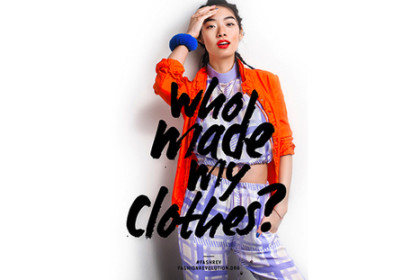
On 24 April 2015, Fashion Revolution Day, people in 66 countries around the world will challenge global fashion brands to demonstrate commitment to transparency across the length of the value chain, from farmers to factory workers, brands to buyers and consumers.
One in six people work in the global fashion supply chain. It is the most labour dependent industry on the planet, yet the people who make our clothes are hidden from us, often at their own expense, a symptom of the broken links across the fashion industry.
Led by some of the biggest names in fashion, Fashion Revolution Day will show that change is possible and celebrate those who are on a journey to create a more ethical and sustainable future for fashion. Model Lily Cole, Blogger Susie Lau, a Eco Age Founder Livia Firth and writer and broadcaster Lucy Siegle are just some of the names expected take part in a mass global action asking brands #whomademyclothes.
Fashion lovers will take a selfie with the label in their clothing showing, send it to a brand via social media, asking ‘who made my clothes?’ #whomademyclothes and share their reply. Tens of thousands of people across the globe did this last year and more are expected to take part in the campaign this April. To mark the day, and connect supporters with garment producers all over the world, there will be a series of global ‘social media takeovers’ hosted at @Fash_Rev.
This Fashion Revolution Day marks the second anniversary of the Rana Plaza disaster in Dhaka, Bangladesh, which killed 1133, and injured over 2500 people.
Social and environmental catastrophes in our fashion supply chains continue. Garment workers in Cambodia work six days a week, earning barely enough to meet their basic living expenses, risking malnourishment, which in recent years combined with poor working conditions has caused numerous incidents of mass faintings and collapses in the factories. Cotton production accounts for the use of $2bn of chemical pesticides each year. More than 250,000 cotton farmer suicides have been recorded in India over the last 16 years in the largest wave of suicides in history.
Campaigners will call on the textile value chain to engage in a demonstrable commitment to transparency by: challenging brands and retailers to pledge to make their supply chains more transparent, find out who made their clothes, publish first tier factories and work towards mapping out their entire supply chain.
Fashion Revolution will also demonstrate that change is possible by showcasing examples of those who are already creating a better future for fashion. This is just the start of many years of positive transformation and industry-wide collaboration through Fashion Revolution Day.
Fashion Revolution’s hashtag was the number one global trend on Twitter last year and events are being organized around the world by teams in 66 countries. For events in your area, visit http://fashionrevolution.org/get-involved/countries/.
Find out more at http://www.fashionrevolution.org/. Like Fashion Revolution on Facebook at facebook.com/fashionrevolution.org and follow @Fash_Rev on Twitter.
www.fermoeditore.it
 English
English  Italiano
Italiano 



